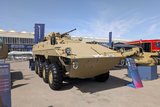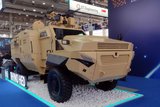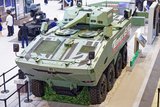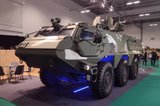Oshkosh wins US Army FMTV order
Oshkosh Defense has received an order from the US Army to manufacture and deliver 698 Family of Medium Tactical Vehicles (FMTV) trucks from 2016, the company announced on 2 July. The $184 million order was awarded by the TACOM life cycle management command of the army.
The Oshkosh FMTV is a series of 17 models and 23 configurations with over 80% commonality across all chassis variants, which feature payload capacities ranging from 2.5 to ten tonnes.
The FMTV has been used in combat and tactical operations, unit resupply missions and relief efforts. It features crew-protective armour and other technologies for mobility, protection and versatility.
Oshkosh Defense has been producing FMTVs for the army since 2010, delivering over 22,000 trucks and 11,000 trailers so far.
John Bryant, senior vice president of defense programs, Oshkosh Defense, said: 'The Oshkosh FMTV delivers unprecedented durability and reliability while meeting the demands of the mission and our soldiers on today's battlefields.
'The FMTV programme is a prime example of how Oshkosh has worked with the US Army to deliver a very successful vehicle programme that achieves all of the quality, performance, schedule and cost objectives – and ultimately puts a great truck in the hands of our soldiers, who deserve nothing less.'
Related Equipment in Defence Insight
More from Land Warfare
-
![Singapore Airshow 2026: ST Engineering’s Terrex s5 highlights hybrid power’s role in future warfare]()
Singapore Airshow 2026: ST Engineering’s Terrex s5 highlights hybrid power’s role in future warfare
Hybrid-electric drive technology may address the growing energy demands of land warfare in future.
-
![CAVS rides a wave and prepares for surge requirements as orders roll in]()
CAVS rides a wave and prepares for surge requirements as orders roll in
The Common Armoured Vehicle System is continuing to rack up orders as the British Army looks likely to become an operator of the vehicle, while Italy and Ireland are also contenders.
-
![US DoD task force’s DroneHunter acquisition lays groundwork for Replicator 2 CUAS strategy]()
US DoD task force’s DroneHunter acquisition lays groundwork for Replicator 2 CUAS strategy
As the US Department of Defense looks to counter the growing threat of uncrewed aerial systems to improve homeland security, the DroneHunter acquisition could point to future commercial innovation.























